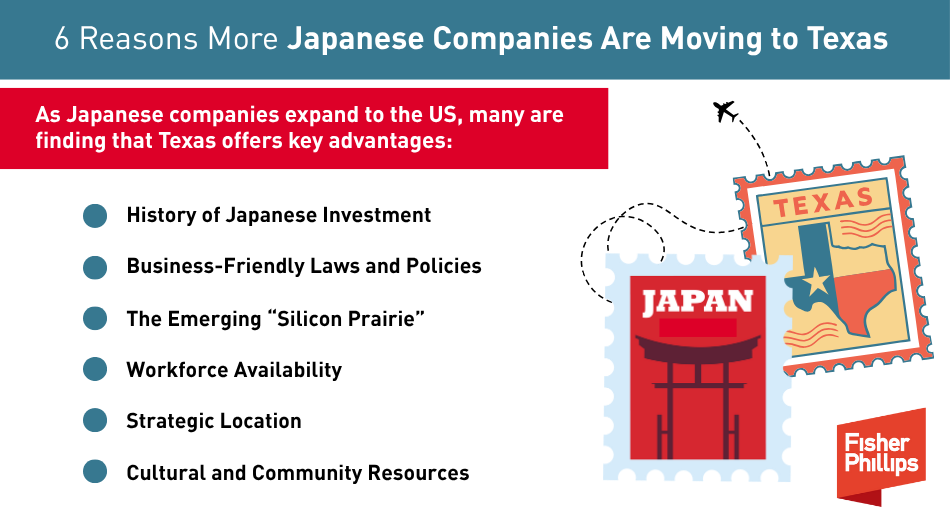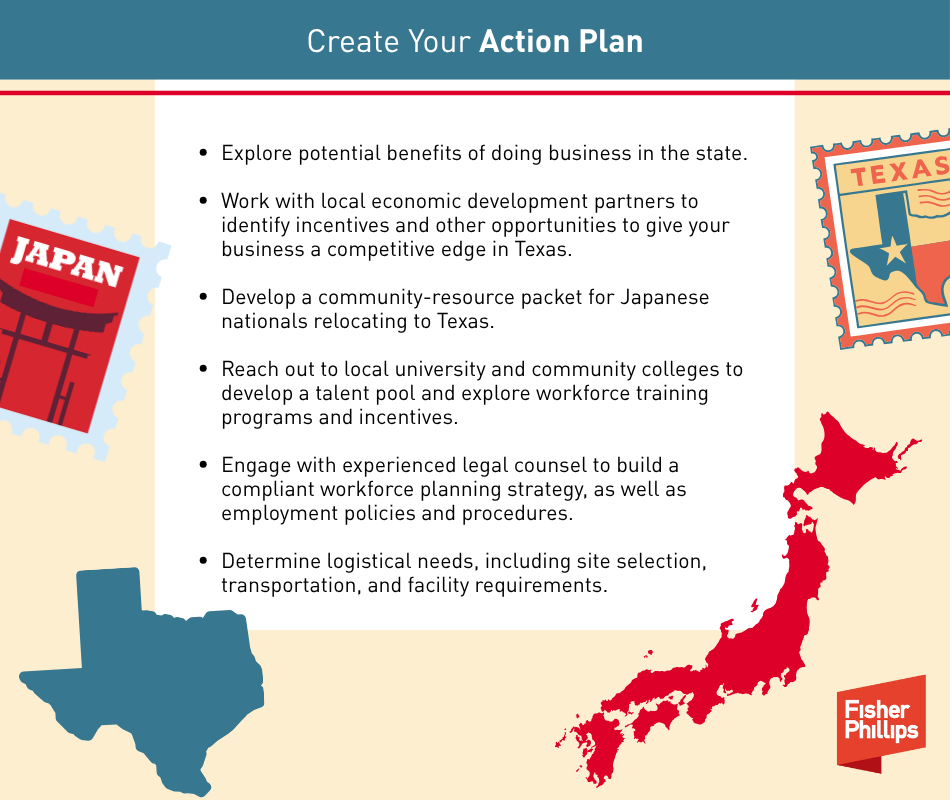6 Reasons More Japanese Companies Are Moving to Texas: Your Strategic Guide
Insights
6.18.25
As Japanese companies expand to the US, many are finding that Texas offers key advantages for long-term growth, particularly in the Dallas and Houston regions. Notably, Texas lawmakers have taken steps in recent years to attract Japanese businesses and strengthen economic relationships. Indeed, the Texas Economic Development Corporation reports that over 400 Japanese companies currently operate in the state, covering a variety of industries including manufacturing, technology, telecommunications, automotive, and logistics. Why has Texas emerged as a hotspot for Japanese investment? Whether you’re establishing your first US location or expanding existing operations, here are the top six reasons Japanese companies are doing business in the Lone Star State.
1. History of Japanese Investment
Texas is the second largest state in the US – both by population and GDP – and is also among the 10 largest economies in the world. These statistics demonstrate why Texas is a popular expansion spot for businesses. According to the Texas Economic Development and Tourism Office, Texas received 119 Japanese foreign direct investment (FDI) projects from 2012 to 2022, totaling $6.9 billion in capital investment and creating over 19,000 jobs. Additionally, a 2023 survey from the Japan External Trade Organization (JETRO) revealed that about two-thirds of Japanese businesses already in Texas planned to expand over the next few years.
During a visit to Tokyo last year, Texas Governor Greg Abbott signed a statement of mutual cooperation (SMC) with Governor of Aichi Prefecture Hideaki Ohmura. “This agreement will encourage investment, trade, and collaboration in critical areas like medicine, life sciences, biotechnology, energy, innovation, and so much more,” Abbott said.
2. Business-Friendly Laws and Policies
Businesses operating in Texas have some advantages to keep their operating costs relatively low. For example, Texas has no state income tax and a more business-friendly tax and regulatory environment than many other major US business hubs. Real estate and labor costs are comparatively more affordable as well. Additionally, the state offers incentive programs through local economic development partnerships, such as property tax abatements, training grants, and sales tax exemptions.
3. The Emerging “Silicon Prairie”
In addition to being a hub for aviation, auto, and healthcare, the Dallas-Fort Worth area has recently been dubbed the “Silicon Prairie” due to the large number of tech companies moving to the area. Industry sectors include microchip and semiconductor manufacturing, as well as telecommunications and other IT sectors. Notably, state lawmakers approved the Texas CHIPS Act in 2023, launching the Texas Semiconductor Innovation Fund providing subsidies to chip manufacturers and related research funds to universities. Thus, Japanese tech companies may have some unique incentives to build a Texas presence into their strategic plans.
4. Workforce Availability
Texas has one of the largest US labor pools with about 14 million workers in nonagricultural industries and almost a million workers in manufacturing, according to a 2024 Texas Workforce Report. The Dallas–Fort Worth and Houston metro areas, specifically, are the state’s biggest labor markets with about 4 million and 3.5 million workers in each area, respectively, and economic growth rates that exceed national averages. The state also has a strong university system, as well as workforce training partnerships, providing a highly skilled talent pool for businesses in a range of industries.
5. Strategic Location
The infrastructure in Texas offers some logistical advantages, such as direct flights from Tokyo to Dallas-Fort Worth and Houston, deepwater ports on the Gulf Coast in Houston and Freeport, and extensive road and rail networks for North American distribution. Its location also makes Texas an optimal spot for accessing markets in Mexico and Latin America more broadly.
6. Cultural and Community Resources
Texas has the fourth largest Japanese population (65k individuals) in the US, according to Pew Research Center. Metro areas such as Dallas and Houston have ample resources to support Japanese nationals relocating to the US, including Japanese language schools and cultural centers.
Create Your Action Plan
Japanese businesses entering or expanding in Texas should consider taking the following steps:
- Explore potential benefits of doing business in the state, including cost savings, as well as logistical and infrastructural advantages.
- Work with local economic development partners to identify incentives and other opportunities to give your business a competitive edge in Texas.
- Develop a community-resource packet for Japanese nationals relocating to Texas.
- Reach out to local university and community colleges to develop a talent pool and explore workforce training programs and incentives.
- Engage with experienced legal counsel to build a compliant workforce planning strategy, as well as employment policies and procedures.
- Determine logistical needs, including site selection, transportation, and facility requirements. FP’s site selection team has substantial experience helping Japanese companies select R&D and manufacturing sites in the US. Additionally, FP’s global consulting firm, Fisher Worldwide provides an international network of legal and HR consultants who can provide critical support.
Fisher Phillips can help you navigate US laws and leverage opportunities for expansion in the North American market. We’ll continue to monitor developments and provide the most up-to-date information directly to your inbox, so make sure you are subscribed to Fisher Phillips’ Insight System. If you have questions, contact your Fisher Phillips attorney, the authors of this Insight, or any attorney in our Texas offices or Tokyo office.
Related People
-
- John M. Polson
- Chairman & Managing Partner
-
- Adam F. Sloustcher
- Regional Managing Partner
-
- Emily P. Harbison
- Regional Managing Partner




